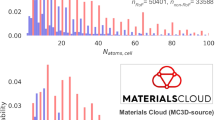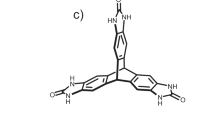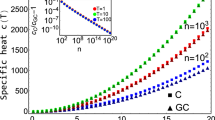Abstract
THE theory of allotropy assumes that every state of aggregation of a so-called single substance is complex, so that every crystalline state consists of mixed crystals, built up of molecules of different kinds. These different kinds of molecules can change the one into the other. The transformation can lead to a chemical equilibrium, and only when this equilibrium (inner equilibrium) is established does such a pure substance behave as a real single substance.
This is a preview of subscription content, access via your institution
Access options
Subscribe to this journal
Receive 51 print issues and online access
$199.00 per year
only $3.90 per issue
Buy this article
- Purchase on Springer Link
- Instant access to full article PDF
Prices may be subject to local taxes which are calculated during checkout
Similar content being viewed by others
References
NATURE, 113, 855, June 14, 1924.
J. Chem. Soc., 1603; 1926.
E. Adinolfl (Atti R. Accad. Lincei, 8, 381 ; 1928) found that the specific heat of bismuth is increased by about 14 per cent and that of tellurium by 8 per cent by exposure to X-rays. D. Coster and A. v. d. Ziel (Z. physik. Chem., B, 20, 283; 1933) found that irradiation with X-rays of the monoalkyl malonic acids accelerates strongly the transformations taking place in these substances.
Author information
Authors and Affiliations
Rights and permissions
About this article
Cite this article
SMITS, A., MOERMAN, N. Complexity of the Solid State. Nature 134, 698–699 (1934). https://doi.org/10.1038/134698a0
Issue Date:
DOI: https://doi.org/10.1038/134698a0
This article is cited by
Comments
By submitting a comment you agree to abide by our Terms and Community Guidelines. If you find something abusive or that does not comply with our terms or guidelines please flag it as inappropriate.



